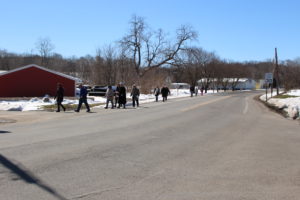2019 All-America City Finalist – Livingston County, NY
Application Summary for the All-America City Awards:
Livingston County, New York is in the Finger Lakes region of New York State. The rural nature of Livingston County creates a barrier to the access of medical care by many residents, making a strong civic infrastructure even more necessary.
Livingston County’s shared vision and culture of collaboration are evident in the Thrive LivINgston Initiative and the Genesee Valley Health Partnership. The Thrive Initiative was developed by community stakeholders and is led by a steering committee that focuses on community needs, such as affordable housing, job creation, public transportation, education, and community revitalization. Engagement with various sectors of the community also routinely occurs through the Genesee Valley Health Partnership (GVHP), a non-profit, rural health network comprised of more than forty organizations based in, or providing services to, Livingston County. Residents are also engaged through the Be Well initiative which goes directly to those individuals most affected bybesity rates to involve them in any health initiatives being planned.
Three project examples showing how this community leverages civic engagement, collaboration, inclusiveness and innovation to successfully address local issues:
1.) Be Well LivINgston
The mission of Be Well LivINgston is to support sustainable healthy lifestyle choices within communities through policy, system, and environmental changes.
The Be Well Committee of the Genesee Valley Health Partnership identified Nunda as a high-need area after statistics revealed that 37% of Keshequa School District students in Nunda are overweight or obese and one in every six Nunda residents is living in poverty.
The committee mobilized Nunda residents and stakeholders in a comprehensive needs assessment to address these public health concerns. The committee collected data and demographics, identified existing health resources, and determined gaps in services. The needs assessment included focus groups, surveys, School Health Index assessment, and the CHANGE assessment.
The committee hosted meetings directly in Nunda to allow for wider participation. This enabled those most affected by obesity to be actively involved in the process. The Be Well Steering Committee was also established and is comprised of Nunda residents.
So far, policy adoptions and system-wide changes have occurred. Flexible schedules now allow school-district employees to take time to seek medical care, and a small practice within walking distance now provides medical care to employees during their lunch hour. Additional activities have included a Boy Scout-led colon cancer screening initiative, a Holiday Walk & Hike, and the establishment of a historical walking trail.
Additional priorities identified by residents—community outreach programs, healthier grocery store options, opportunities for physical activity, and methods to address drug use—are included in the long-term strategic plan for the Greater Nunda Area.
2.) Connect LivINgston
As a rural community, proper transportation is necessary to improve quality of life, ensure economic vitality, and support resident health.
 Connect LivINgston is a plan that was developed by examining issues, opportunities, and connections for walking, biking, car, public transit, air, water, and rail transportation at the county level. The plan ties the transportation system into continuing local, county ,and regional planning efforts. The plan fosters partnerships and connections between government, private, non-profit, and educational agencies. The plan received national recognition by the Federal Highway Administration (FHWA) and the Federal Transit Administration (FTA) in the agencies’ 2015 Transportation Planning Excellence Awards (TPEA).
Connect LivINgston is a plan that was developed by examining issues, opportunities, and connections for walking, biking, car, public transit, air, water, and rail transportation at the county level. The plan ties the transportation system into continuing local, county ,and regional planning efforts. The plan fosters partnerships and connections between government, private, non-profit, and educational agencies. The plan received national recognition by the Federal Highway Administration (FHWA) and the Federal Transit Administration (FTA) in the agencies’ 2015 Transportation Planning Excellence Awards (TPEA).
Implementation of Connect LivINgston strategies began soon after the plan was adopted, starting with the establishment of the Livingston County Transportation Council whose mission is to help guide implementation efforts at the county level. The Transportation Advisory Council has an annual work program that focuses on using the strategies identified in the plan to improve connectivity and efficiency in the transportation network for the safety, health, and benefit of county residents.
One recent and notable achievement is the development of a mobility management website which provides a clearinghouse of transportation options for all residents and visitors. The trip planning website provides information to the public regarding all transportation resources and choices that are currently available to county residents, with a specific emphasis on older adults, people with disabilities, and individuals with lower incomes in need of specialized transportation services.
3.) Empower LivINgston
When inmates are released from jail, they are faced with the challenges of finding and maintaining employment and obtaining health care services, insurance, transportation, and housing. While the Livingston County Jail offers programs to work with inmates on these issues when they are in custody, there is no single agency or group of agencies designated to provide “pre” and “post” release interventions.
The Departments of Health, Mental Health, Workforce Development, and Human Services agencies are aligned with the resources and knowledge to meet the inmate’s needs “pre” and “post” release. Fortunately, funding through Catholic Charities has allowed for the strengthening of this infrastructure.
The “empowerment” process begins when an individual is booked. A full-time transitional counselor identifies needs and tailors a plan for each inmate. A full-time nursing staff member and forensic therapist perform medical assessments and medication reviews. A health navigator assists the inmate with obtaining health insurance, post-release. Additionally, substance abuse counselors are available, and a Workforce Development team helps individuals explore career options.
Other successful work is being accomplished within the community to reduce the inmate population and to provide public safety and social support. Substance abuse and behavioral specialists are working with road patrol to assist with drug overdoses or mental hygiene concerns. Having supportive and knowledgeable staff at the incident has proven a successful strategy for intentional drug overdoses. That, together with the Livingston County Suicide Task Force, has resulted in a significantly reduced number of suicides and unexpected hospitalizations.
Some Related Posts
Thank You to Our Key Partners



